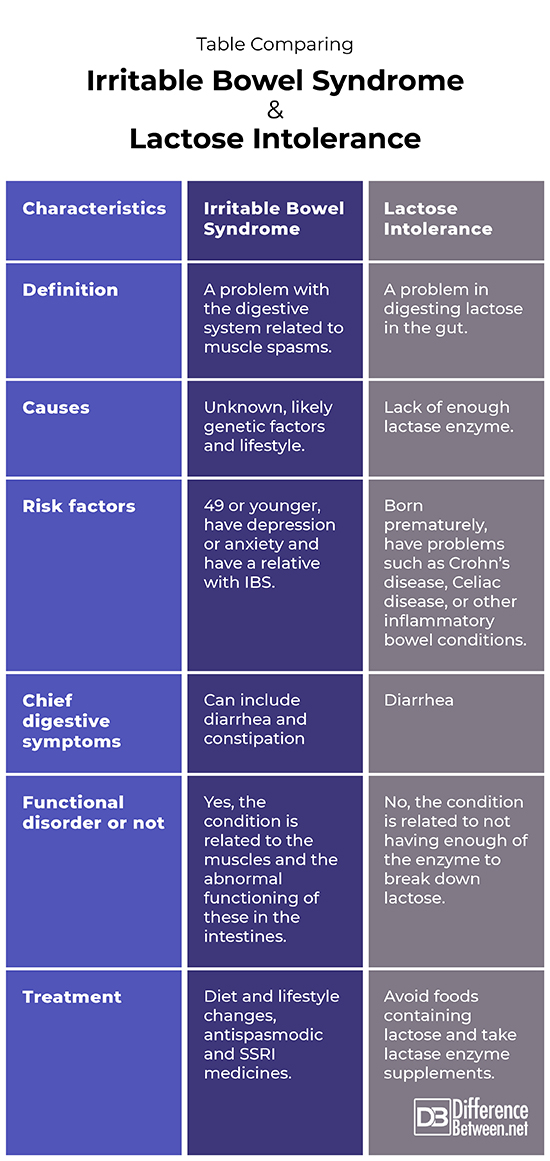Difference Between Irritable Bowel Syndrome and Lactose Intolerance
Irritable bowel syndrome is when there is a problem with how the intestines work. Lactose intolerance is when lactose is not properly digested, causing digestive difficulties.

What is Irritable bowel syndrome?
Definition:
Irritable bowel syndrome is a medical condition of the digestive system which is related to the muscles of the intestine.
Causes:
Scientists are unsure of why someone may develop IBS. It does seem to involve several factors including psychological factors like depression and stress. Physiological factors involve how the muscles of the intestine contract.
Diagnosis:
Diagnosis is often based on excluding other digestive disorders and may include tests like X-ray endoscopy, and colonoscopy.
Symptoms and complications:
Symptoms include muscular spasms of the gut, pain in the lower parts of the abdomen, and also a lot of bloating due to gas accumulation in the gut. The person may suffer constipation and also diarrhea or one or the other of these symptoms. Certain foods may worsen symptoms and stressful events and psychological problems also may worsen the condition. IBS can result in a decreased quality of life.
Treatment:
Treatment options for IBS include a change to eating foods that seem to cause less irritation to the gut. Medicine may include antispasmodics or selective-serotonin reuptake inhibitors (SSRIs).

What is Lactose intolerance?
Definition:
Lactose intolerance is the condition in which an individual cannot properly digest the carbohydrate lactose.
Causes:
People who have lactose intolerance seem to not have sufficient amounts of the enzyme lactase which is needed to break down the lactose. Lactose intolerance can occur from birth and can be inherited as recessive alleles of the genes. In other words, the parents may be carriers who inadvertently pass on the genes that hinder lactose production. Other possible causes include injury to the intestines from infections.
Diagnosis:
Diagnosis is based on a clinical examination, a noting of symptoms and family history, and a hydrogen breath test.
Symptoms and complications:
Some of the signs of lactose intolerance are similar to other conditions and include bloating, stomach cramps, diarrhea, and nausea. However, unlike other illnesses, the symptoms only occur after eating or drinking dairy products that typically contain lactose. A lack of calcium in the diet because of lactose intolerance can lead to osteopenia or osteoporosis.
Treatment:
Patients need to be taught which foods to avoid so as to reduce the symptoms. While it is easy to avoid dairy products, lactose can sometimes be present in foods one does not think of. Checking food labels for the presence of lactose is the best option. Taking lactase enzyme supplements before eating is also helpful in some cases.
Difference between Irritable bowel syndrome and Lactose intolerance
Definition
Irritable bowel syndrome is a medical problem that is related to the action of the intestinal muscles. Lactose intolerance is an inability to digest lactose properly due to a deficiency of lactase.
Causes
IBS may be linked to genes, stress, and depression. The cause of lactose intolerance is a lack of the enzyme lactase.
Risk factors
There is a greater chance of IBS if you are aged 49 or younger, have depression or anxiety, and have a relative who is ill with this condition. The risk factors for lactose intolerance include being a premature infant, having Celiac disease, Crohn’s disease, or other gut inflammation problems.
Chief digestive symptoms
IBS has motility symptoms of diarrhea or constipation or both. Lactose intolerance has symptoms of diarrhea and never constipation.
Functional disorder or not
IBS is a functional problem with the muscles of the intestine. Lactose intolerance is not related to the muscles but to the indigestion of the carbohydrate, lactose.
Treatment
The treatment of IBS includes a lifestyle change in which there is decreased stress, as well as the use of antispasmodic and SSRI medicine. The treatment of lactose intolerance entails avoiding dairy foods and other food items that contain lactose and taking lactase supplements.
Table comparing Irritable bowel syndrome and Lactose intolerance

Summary of Irritable bowel syndrome and Lactose intolerance
- IBS and lactose intolerance do commonly occur together in a person.
- IBS typically results in painful spasms of the intestines and problems with constipation or diarrhea.
- Lactose intolerance causes diarrhea and bloating.
FAQ
How can you tell the difference between lactose intolerance and IBS?
Lactose intolerance occurs soon after eating certain food that has lactose present, while IBS is not linked to only one type of food.
Is there a correlation between irritable bowel syndrome and lactose intolerance?
There is no specific scientific link between IBS and lactose intolerance although some people may have both conditions.
What does your poop look like if you are lactose intolerant?
Stools are loose and watery because the lactose is not digested.
Can milk cause irritable bowel syndrome?
Milk may worsen IBS in some people but it could be coincidental if the person has lactose intolerance as well as IBS. Milk is also high in fat, which may worsen IBS symptoms.
- Difference Between Rumination and Regurgitation - June 13, 2024
- Difference Between Pyelectasis and Hydronephrosis - June 4, 2024
- Difference Between Cellulitis and Erysipelas - June 1, 2024
Search DifferenceBetween.net :
Leave a Response
References :
[0]Matthews, Stephanie B., et al. "Systemic lactose intolerance: a new perspective on an old problem." Postgraduate medical journal 81.953 (2005): 167-173.
[1]Mayo Clinic. “Lactose intolerance”. Mayo Foundation for Medical Education and Research (MFMER), 2022, https://www.mayoclinic.org/diseases-conditions/lactose-intolerance/symptoms-causes/syc-20374232
[2]Moleski, Stephanie M. “Irritable Bowel Syndrome (IBS)”. Merck Manual, 2020, https://www.msdmanuals.com/professional/gastrointestinal-disorders/irritable-bowel-syndrome-ibs/irritable-bowel-syndrome-ibs
